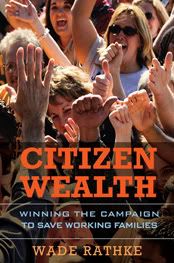
The topic below was originally posted on my blog, the Intrepid Liberal Journal.
It seems no matter which political party in America holds the majority, a Washington/Wall Street corporate centric axis dominates policy making. Indeed, Illinois Democratic Senator Dick Durbin recently observed that banks, “Frankly Own the Place.” Among liberal-progressive activists like myself, this condition has facilitated a confrontational mindset.
Our experience suggests that the power and wealth concentrated in the hands of a few will not be voluntarily relinquished. Hence, everything from healthcare reform to bankruptcy protection for aggrieved homeowners is perceived by many of us as a high stakes pitched battle between struggling families and feculent corporate behemoths. Although activism has certainly facilitated important victories on behalf of working people, fighting for economic justice often seems analogous to climbing an endless wall.
Veteran activist Wade Rathke has been steadily climbing that wall on behalf of working people for forty-years. As the founder of the Association of Community Organizations for Reform (“ACORN”), Rathke has a unique perspective about what community organizing strategies work best to empower working people that are struggling to save and accumulate wealth. Rathke is also an assertive advocate for welfare benefits on behalf of people out of work. He’s both won and lost more than his share of battles. Both he and ACORN have the battle scars of scrutiny liberals typically receive from standing up for America’s poor and disenfranchised.
In Citizen Wealth: Winning the Campaign To Save Working Families, (Berrett-Koehler), Rathke writes,
“We need to create a national economic and political consensus that increasing family income, wealth and assets is not `welfare’ or an entitlement `give-away’ program but an investment in the public good and well-being.”
His book is an accessible thirteen chapters and 171 pages of text presenting his blueprint to organize regular folks to win economic and political power. Rathke’s book also contains revealing anecdotes about ACORN’s negotiations with corporate entities such as H&R Block and their bank, HSBC, to end the predatory practice of Refund Anticipation Loans. Perhaps the most compelling topic in his book is covered in chapter nine when Rathke laments how millions of citizens eligible for Food Stamps, Medicaid and the State Children Health Insurance Program (“SCHIP”) are disenfranchised from participating in the very programs designed to help them.
Rathke has remained involved with organizing activities after leaving ACORN in 2008. He is the founding board member of the Tides Foundation as well as the chief organizer of SEIU Local 100 in New Orleans and publisher of Social Policy magazine. He posts regularly at the Chief Organizer blog.
Rathke agreed to a telephone podcast interview with me about his book and among the topics covered is the meaning of citizen wealth, why economic justice has lagged behind expanded civil liberties for minorities and women, the methodology of ACORN’s approach to fight H&R Block’s predatory practices of Refund Anticipation Loans, the criticisms ACORN and the Community Reinvestment Act have received about the housing crisis and his belief that worker/labor organization is imperative for all segments of society. Our conversation was twenty-eight and a half minutes.
This interview can also be accessed at no cost the Itunes Store by searching for either the “Intrepid Liberal Journal” or “Robert Ellman.”

able to take the time to listen.